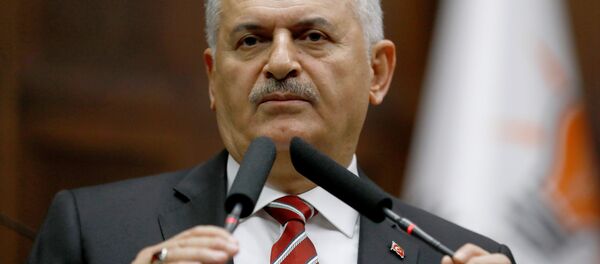On Sunday, over 51 percent of Turkish voters supported the proposed reform turning Turkey into presidential republic which was criticized by many European leaders who expressed concerns that it would grant unlimited powers to current President Recep Tayyip Erdogan and potentially harm the country's democracy.
“There is no extension of the president’s powers… New system provides catching out much power from the president even to the parliament … Today president cannot be sued for any action he has done except betraying the country. Only one subject you can question or sue him. But in a new system you can sue him on any subject. Parliament will become much stronger,” Tuna said.
Ozturk Yilmaz, the deputy chair responsible for foreign relations of the opposition Turkish Republican People's Party's (CHP) criticized the reform in a comment to Sputnik.
"This [constitutional reform] is the end of Turkish parliamentary democracy, the end of separation of powers, the end of rule of law and the end of democratic principles in Turkey. From now we will talk about different Turkey which is more designed and crafted by one-man regime and one person who is Recep Tayyip Erdogan," Yilmaz said.
Yilmaz called the outcome of the referendum illegitimate, "given the votes stealing at the bailout boxes."
Tuna rejected the accusations made by the opposition about violations allegedly committed during the referendum and refuted criticism of YSK's decision to accept unstamped ballots, a measure which was taken to ensure that people could vote at the stations which ran out of stamped ballots.
“This vote is in the nature of democracy. You get something you ask people. They [opposition] lost the vote and another side won … The stamp issue is a technical thing. There is no doubt of the votes countable. I don’t think there will be something serious. The gap [between results] is too big,” Tuna added.
Following the constitutional reform, the Turkish Parliament will receive the powers to launch investigation and impeachment proceedings against the sitting president. The number of seats in the Parliament will be increased from 550 to 600 and the minimum age limit for parliamentarians will be reduced from 25 to 18. Instead of every four years, legislative elections will be held once every five years and on the same day as the presidential election.
At the same time, Erdogan will have the right to become the head of the political party he represents, something which is not allowed under current legislation, and to stay in office for two more terms. The president will also have the ability to appoint vice presidents, ministers and other high ranking officials, while the post of the prime minister will be removed.
Never miss a story again — sign up to our Telegram channel and we'll keep you up to speed!



